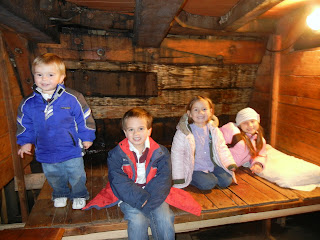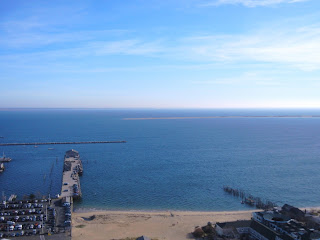After studying Colonial American History for several months, our family had the unique opportunity of taking an extended vacation to the historic city of Boston. We gave a preview of one of the most cherished experiences of this vacation--our dinner on Plymouth Plantation--on our family blog, but the rest of our adventures are documented here on our homeschool blog.The full three week visit was much like an extended field trip where we were able to see first hand so many of the places we had learned about in our readings, including sites as far south as Philadelphia and sites as farth north as Concord. It was absolutely amazing, and an expereince none of us will ever forget. Although we could not visit all of the sights in chronological order, I am going to place them on our blog in chronological order, starting with the sights of the first New England settlers, the Pilgrims of Plymouth Plantation. There is much of the colonial history we didn't get a chance to cover, but those topics highlighted in this chronology are those subjects we did get a chance to read about and discuss.
September 6, 1620
102 pilgrims, including James, Susannah, and Mary Chilton, our ancestors, board the Mayflower Ship bound for the New World. They hope to finally gain religious freedom in their new home. While on board they suffer seasickness and countless other ailments, but refuse to become discouraged. They pray, sing, read their Bibles, and trust that God will deliver them safetly to the New World.
November 9, 1620
The Mayflower Ship arrives at Cape Cod in New England. Though the Pilgrims set out for the Hudson River Shores, they are tired of the long days at the mercy of the angry ocean and declare New England to be their new home instead. Two days later, after signing the Mayflower Compact, they send scouts out to survey the cape. Soon they realize no space for a settlement is available and decide to seek a more inland home.
December 11, 1620
A landing party comes ashore on Plymouth Harbor Beach. They wade through icey waves, fighting the wind and sea, and finally secure their shallop to Plymouth Harbor's glacial rock. They warm themselves, drink sweet spring water, and plan the village of Plymouth.
April 1620
After enduring a horrible winter in which half of the Pilgrims die, the time comes for the Mayflower Ship to return to England. Not one person asks to return with the ship. Instead they turn their attention to planting and further developing the settlement. The Settlers are led by Governor William Bradford and eventually, with the help of Squanto and other Indians, find peace and contentment in the New World. In the Fall of 1621, they celebrate their first year at Plymouth with a plentiful harvest feast. This becomes the for-runner of our modern Thanksgiving Celebration.
1630
More immigrants, the Puritans, arrive and form the Massachusetts Bay Company. Eventually the Pilgrims will merge with this company and become the royal colony of Massachusetts.
In the years that follow, eleven more colonies (Virginia was already formed) are formed and populated. Each has unique people and unique contributions to make to the growing nation-to-be.
COLONY
NAME
|
YEAR
FOUNDED
|
FOUNDED
BY
|
BECAME
ROYAL COLONY
|
London
Company
|
|||
1620-1630
|
Pilgrims
and Puritans
|
||
John
Wheelwright
|
|||
N/A
|
|||
Thomas
Hooker
|
N/A
|
||
N/A
|
|||
Virginians
|
1729
|
||
Eight
Nobles with a Royal Charter from Charles II
|
1729
|
||
Lord
Berkeley and Sir George Carteret
|
1702
|
||
Duke
of York
|
|||
N/A
|
|||
1682
|
William
Penn
|
||
1732
|
James
Edward Oglethorpe
|
1752
|
|
For example, one brilliant man named Roger Williams postulates that there should be not only greater religious freedom in the New World, but that there ought to also be a seperation made between Church and State. Although he is banished from Massechussetts for these beliefs, he eventually creates his own colony in 1636--the colony of Rhode Island. After his death, his ideas eventually become more generally accepted and are now an essential part of the American way of thinking and governing.
Other important colonial personalities (that we studied) emerging at the end of the colonial period include: Benjamin
Franklin, George Washington, William Johnson, Samuel Adams, John Hancock, Patrick
Henry, Paul Revere, Thomas Paine, Thomas Jefferson, John Adams, and James
Madison.















No comments:
Post a Comment